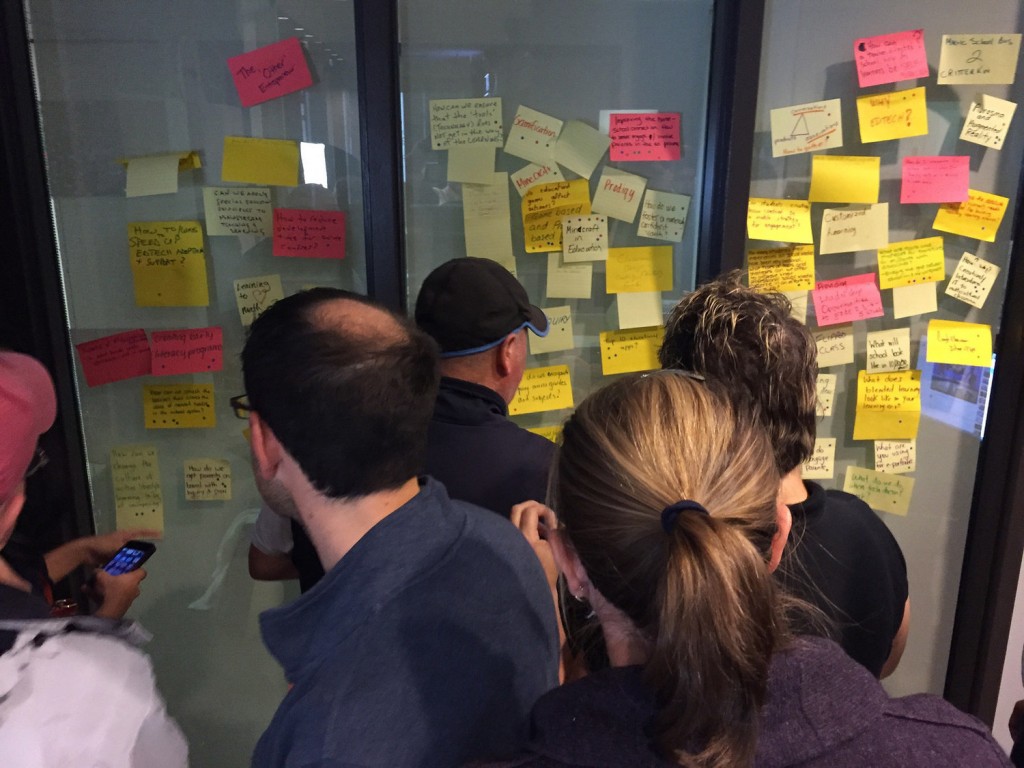This past Saturday, I had the opportunity to be a part of something important in my city. I was an organizer for the annual EdCamp conference in Toronto and had the pleasure of putting a face to some of the most impressionable and inspiring Twitter handles in Education in Ontario. I met educators across my city and beyond who are invested in thinking critically about practice and working towards an end goal of improving it. The few hours I spent this past Saturday conferencing, planning and simply dialoguing with colleagues will inevitably improve my craft as a classroom teacher. For that reason, the EdCamp was great. But that is not why I attended.
For those who are unfamiliar with what an EdCamp is, it is basically a conference that is participant driven, where people organically create the conference’s agenda. There are no lead instructors because the educators, for the educators, create everything. This type of conference is the opposite of traditional meetings where there is a prescribed agenda and limiting fluidity. The banking-model of education was completely thrown out the frosted-over windows on 96 Spadina Avenue this past Saturday.
This flexible and autonomous learning creates engagement. It is a voluntary conference. Thus, any educator who attended was there by choice. Sessions are obviously structured according to time restraints but due to the dynamic of the environment, these sessions become free-flowing. If you are not feeling a session, no problem, get up and leave. Drop into another one. In the rare case that you feel that insidious experience of being “box-in” by some notion of space and power – no problem, send out a tweet expressing your sentiment and within a few seconds someone will be in that room to change the energy and, at the least, make an excuse to get you out of there.
Ironically, how EdCamp Toronto and other EdCamps around North America are designed is precisely how we envision the future of education. Spatially, we are moving to a format of schooling that is less structured and more inviting. Movements like TedEd, FlipClass and HipHopEd are examples of a groundswell of innovation that explicitly points education towards a brighter direction of how we ought to educate our children.
Nonetheless, there are still a few challenges to re-imagining education. The first was quite glaring as I reflected on my EdCamp experience. It is the simple fact that in progressive conferences and think tank assemblies, like an EdCamp, words of insight and improvement merely fall upon the choir’s ears. Our discussions are further converting the converted. The educators that showed up at EdCamp came from all walks of the educational arena; professors, teachers, instructional leads, guidance counselors, principals, and entrepreneurs invested in education and academics all assembled on Saturday morning. But all of the bodies gathered at the conference shared a similar vision aligned by a singular question: How can we make education better?
The problem with education is that, as a percentage, very few educators ever critically ask themselves, or others, this question. Being a teacher requires a commitment that is not typical to most jobs. We have to face the fact that educators are not the managers of some factorial system that produces some random product. The products we produce are human beings. Because of that, the“9-5” job educators do cannot solely be accomplished if we approach teaching like working on a factory line.
Unfortunately, many teachers think like this. In a city that employs over 40,000 teachers, 70 showed up on a brisk Saturday morning to talk about their craft and have discussions on how to improve upon it. Having trailblazers is important. But, when all signs point to deterioration within education, the number of educators present at a free-flowing conference unfortunately points to apathy towards education.
I am not trying to paint a line between the haves and the have-nots in educational work. I am simply voicing my concern about the over-arching theme and suggesting how to move forward. To put it simply, the work educators put in on Saturday was not for them. I attended, but I didn’t come to learn about ways to improve as an educator. The work was not for the people who understood the discourse of the day and physically attended the EdCamp. Conferences like EdCamp are meant for those trailblazers to learn, take what they’ve learned, and spread the word. When we attend conferences like EdCamp with this mentality, we will then be equipped to go back and recruit more educators which will inevitably change the direction of education.
[share title=”Share this Post” facebook=”true” twitter=”true” google_plus=”true”]

